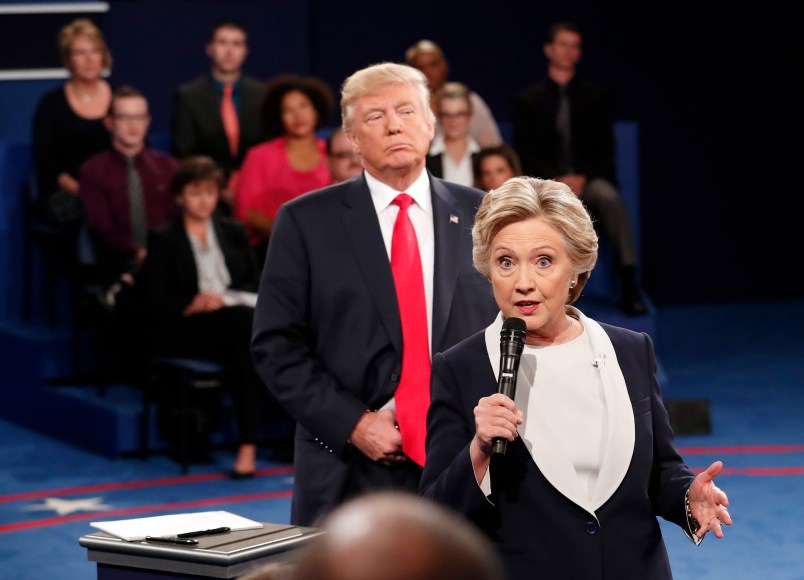I am no good at deciding who won or lost debates. I react to them as a voter and not as a journalist. And I tend to fasten on things that don’t necessarily upset or thrill other voters. Here are two things that bothered me – not because they’ll determine the election, but because they could foreshadow trouble after the election.
What most bothered me about Trump’s statements was his suggesting twice that if he were elected, Hillary Clinton should be put in jail for deleting emails. It’s not an offhand suggestion, but a regular feature (“Lock her up”) of Trump rallies.
There’s a reason why legislators are granted immunity from prosecution. Democracies depend upon the kind of strict separation between criminal prosecution and political difference that doesn’t exist, say, in authoritarian regimes. But since the late 1930s, Republicans have periodically used a strategy of criminalizing politics in order to shift the debate away from the realm of policy or ordinary partisan politics when they suffered from a disadvantage.
In the late ‘30s, the conservative coalition in Congress, consisting of Midwestern Republicans and Southern Democrats, first raised the issue of communists in government in order to discredit the New Deal. Sixty years later, Newt Gingrich’s Republicans called for impeaching Bill Clinton because he had lied about a sexual transgression. Trump has reintroduced that tactic with a vengeance in his campaign, and it surfaced during the debate. If taken to extremes, it can destroy American democracy. And I expect that if Hillary Clinton is elected president in November, we will not have heard the last of this kind of rancid anti-democratic politics.
I liked Clinton’s performance in this debate better than in the first. I liked her defense of Obamacare. I don’t like the program itself – I’m a Medicare for all supporter– but I think she is right about fixing rather than repealing it, and she gave good reasons why. That’s Clinton at her best. What bothered me was what Clinton said about Syria and Russia. I grant that Vladimir Putin seems to be trying to influence the election on Trump’s behalf and that he may have ambitions in Eastern Europe that could lead to serious conflict with NATO. But there’s a real danger in turning the Obama administration’s rift with Putin over the Ukraine and Syria into the grounds for a return to the Cold War. That’s what I heard Clinton doing during the debate.
The Obama administration’s primary adversary in Syria has been Bashar Assad’s regime. It has been responsible for transforming what was initially a civilian Arab Spring-type call for political reform into a brutal civil war that has degenerated into a contest between a dictator bent on retaining his rule even at the cost of destroying his own country and a ragged group of rebels led by Islamist terrorist organizations. Russia, which has historically backed Assad and has a naval base in Syria, has taken Assad’s side, and we have backed Assad’s opponents, while covertly cooperating with Russia and Assad’s other ally, Iran, in fighting one of these terrorist groups, ISIS. It’s a really ugly situation that defies easy answers or obvious choices for alliance.
But in characterizing the war in Syria, Clinton astonishingly blamed the war’s atrocities on “Russian aggression.” And she advocated setting up a “no-fly zone,” a proposal that if it were not seriously narrowed, could lead to an air war between the United States and Russia. The Obama administration has wisely rejected this kind of strategy. Should Clinton’s remarks be taken seriously? There is a precedent: in the 1960 presidential campaign, John Kennedy out-hawked Richard Nixon on Cuba. Kennedy’s hawkishness on Cuba led to the Bay of Pigs fiasco and to a fifty-five years of a destructive policy toward that country. Could Clinton’s posture during the campaign carry over to her presidency? That worries me. But I’ll still take my chances with her over Trump, and I suspect the country will, too, in November, regardless of who won last night’s debate.






